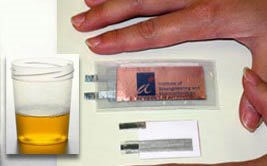
Inexpensive, easily-made medical sensors and disposable testing kits need inexpensive, easily-made power sources, but until now, these have been difficult to come by. "DNA Chip" type biosensors and the like don't need a lot of power, but they do need some. With that in mind, a research team at Singapore’s Institute of Bioengineering and Nanotechnology led by
Dr Ki Bang Lee has devised a cheap-to-make paper battery that uses the fluid being tested --
urine -- as a power catalyst.The battery unit is made from a layer of paper that is steeped in copper chloride and sandwiched between strips of magnesium and copper. This “sandwich” is then laminated in place, which involves passing the battery unit between a pair of transparent plastic films through a heating roller at 120ºC. The final product is 60 mm x 30 mm and has a thickness of just 1 mm (slightly smaller than a credit card).
 Inexpensive, easily-made medical sensors and disposable testing kits need inexpensive, easily-made power sources, but until now, these have been difficult to come by. "DNA Chip" type biosensors and the like don't need a lot of power, but they do need some. With that in mind, a research team at Singapore’s Institute of Bioengineering and Nanotechnology led by Dr Ki Bang Lee has devised a cheap-to-make paper battery that uses the fluid being tested -- urine -- as a power catalyst.The battery unit is made from a layer of paper that is steeped in copper chloride and sandwiched between strips of magnesium and copper. This “sandwich” is then laminated in place, which involves passing the battery unit between a pair of transparent plastic films through a heating roller at 120ºC. The final product is 60 mm x 30 mm and has a thickness of just 1 mm (slightly smaller than a credit card).
Inexpensive, easily-made medical sensors and disposable testing kits need inexpensive, easily-made power sources, but until now, these have been difficult to come by. "DNA Chip" type biosensors and the like don't need a lot of power, but they do need some. With that in mind, a research team at Singapore’s Institute of Bioengineering and Nanotechnology led by Dr Ki Bang Lee has devised a cheap-to-make paper battery that uses the fluid being tested -- urine -- as a power catalyst.The battery unit is made from a layer of paper that is steeped in copper chloride and sandwiched between strips of magnesium and copper. This “sandwich” is then laminated in place, which involves passing the battery unit between a pair of transparent plastic films through a heating roller at 120ºC. The final product is 60 mm x 30 mm and has a thickness of just 1 mm (slightly smaller than a credit card).


0 Comments:
Post a Comment
<< Home